Sign up for the Family Tree Newsletter Plus, you’ll receive our 10 Essential Genealogy Research Forms PDF as a special thank you!
Get Your Free Genealogy Forms
"*" indicates required fields
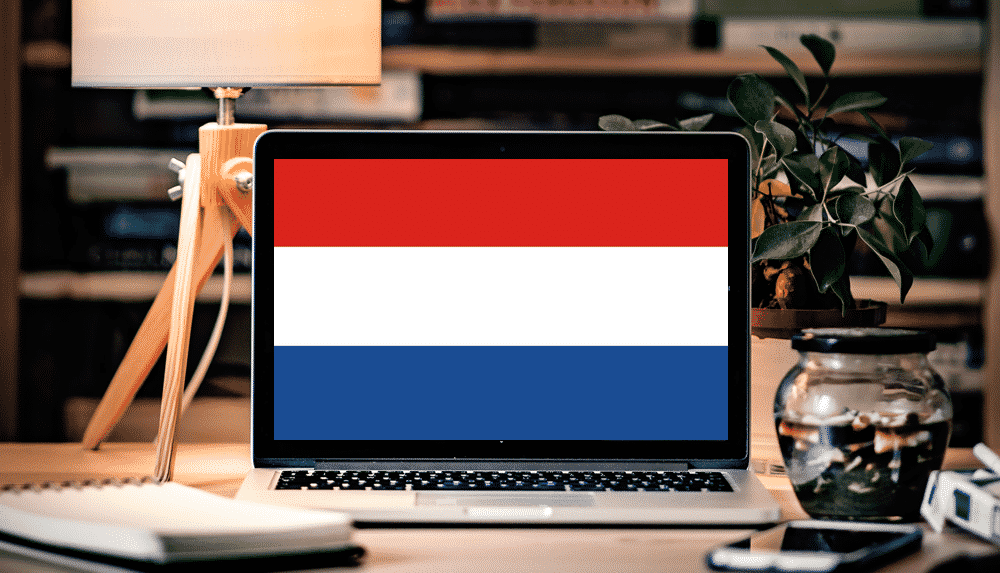
If your ancestors once lived in the Netherlands, you’re very lucky. Not only do you get to visit this beautiful country and enjoy its famous cheeses, windmills, tulips and wooden shoes—but you’re also able to do a lot of your research online. What could be better than sitting in your armchair and searching through millions and millions of index entries on Dutch genealogy websites, plus original record images from archives all over the Netherlands?
Every week, more and more records and images become available. The Dutch legal system is a true blessing for genealogists and other researchers. The law not only prescribes that archives should be accessible for everybody (with some exceptions for more recent records), but also that use of archival collections should be free. As a result, every government website in the Netherlands offers its records for free—and in many cases, copies of those records are free, too. Even better, many archives nowadays offer free scanning on demand.
Sure, you can research your Dutch ancestors on the big genealogy websites. But you can get closer to the heart of your ancestry by tapping into these five Dutch genealogy websites.
1. Open Archives
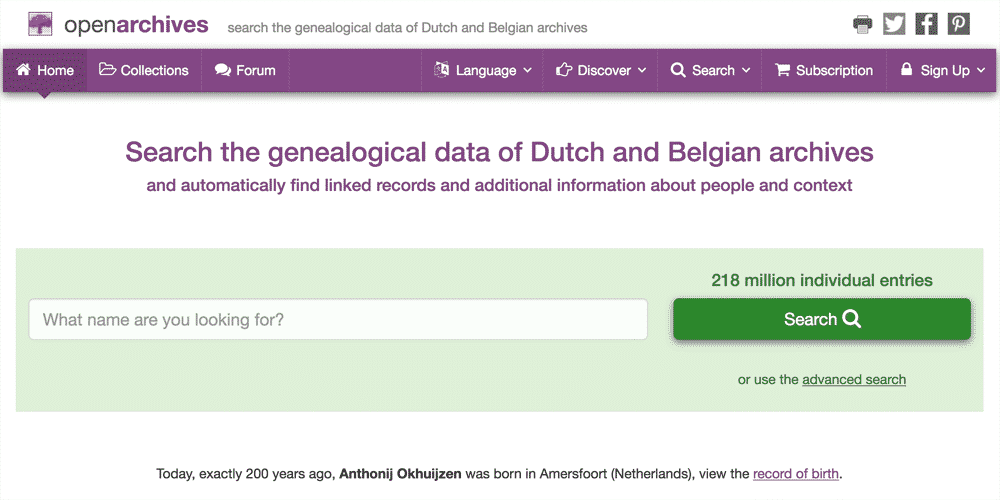
As in many other countries, it is difficult to find one database that covers everything. Only two Dutch websites cover the whole country. One of them is the well-known WieWasWie, hosted by the Centraal Bureau voor Genealogie (CBG, or Netherlands Center for Family History). The other is OpenArch, short for either OpenArchieven (in Dutch) or OpenArchives (in English).
As the name implies, the multilingual website OpenArchives holds Dutch archival records. You’ll find a wide variety of records here, including civil records, population registers, church books and military and notarial records. The site is free to use, though you can unlock additional features with a paid Plus subscription.
With more than 215 million historical person references, it is the largest database dedicated to Dutch genealogy. The “open” in the name stems from the fact that all data on the website is shared by around 90 Dutch (and some Belgian) archives and societies.In other words, the site has open data.
Start searching with a name (or two) and perhaps a year. You can sort, download and filter your results by source type, place, role (i.e., how the person is related to the record’s event) and year. Click the highlighted text to view details. Each record’s page is clean and easy to digest, with a graphic indicating how people mentioned in the record related to each other. Here, you can also view an image of the record if a scan is available. (If OpenArchives doesn’t have the record image, the record page will have links to relevant digital collections on FamilySearch.)
A record’s page will also automatically pull links to other records related to individuals mentioned in the record. Links include other records on OpenArchives, but also records from external sources like the Dutch Biographical Portal.
Along the right side of a record page, you may also see additional details that provide context for the recorded event: historical weather on the event date, information from the census about the event place, and historical maps showing the event place.
2. Delpher
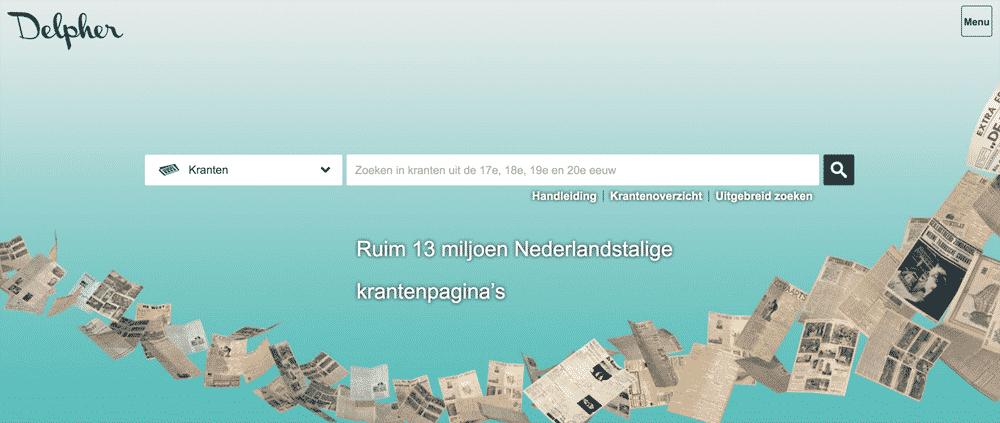
Several archives in the Netherlands offer digitized newspapers from their town or region, such as the city archives of Nijmegen and Leiden or the provincial archives of Friesland. But, with more than 100 million digitized pages (dating from 1618 to the 1990s), Delpher boasts the largest collection by far. A collaboration between Koninklijke Bibliotheek (the National Library), university libraries, archives and several other organizations, Delpher also offers books and magazines.
Delpher does not have an English-language side, so non-Dutch speakers will have to use a tool such as Google Translate to navigate. But the extra effort is worth it—in the site’s newspapers, you’ll find important background information on families, places or events that shaped your Dutch ancestors’ lives. For example, newspapers covered the potato disease in 1845 that drove a wave of emigration from the northern provinces (Friesland, Groningen and Drenthe) to the United States. The newspapers also contain passenger lists, death announcements and promotions of army officers.
You can also use this website to learn what Dutch newspapers wrote about regarding events in the United States, Ireland or Australia. The database also contains a few Dutch newspapers that were printed by Dutch emigrants in the United States. One, De Sheboygan Nieuwsbode (The Sheboygan News Messenger) of Grand Rapids, Mich., presented itself as “the only organ for Dutchmen in North America, dedicated to the news, the situation and the interests of the old and new homeland.”
3. Amsterdam City Archives
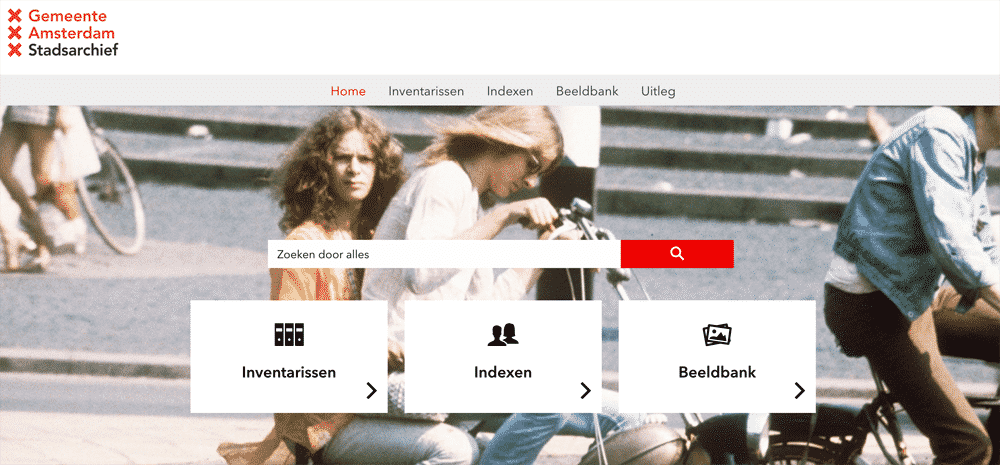
Amsterdam is the biggest city of the Netherlands, as well as the country’s capital. But the city has another distinction, too: The Gemeente Amsterdam Stadsarchief (Amsterdam City Archives) holds a huge collection of digitized Dutch records. The website is a true treasure trove, though (like OpenArchive) it’s only available in Dutch; there is no English interface.
Among the City Archives’ collections, you’ll find digitized photos, drawings and paintings that not only show buildings (such as churches and houses), but also people and events . The site’s historical maps can help researchers find their way through 19th-century Amsterdam.
Even more valuable are the indexes of genealogical data , as well as finding aids that provide background information and links to digitized records. In the indexes, you’ll find:
- population registers
- family and person record cards
- patient registers
- alien registers
In addition, the collection’s burial, baptism and wedding registers are especially helpful when researching ancestors who lived in Amsterdam before civil registration began in the early 1800s. These collections don’t have digital indexes available (FamilySearch volunteers are working on them), but the finding aids do include contemporary handwritten indexes. The index for record group 5009 lists all available registers that have births, marriages and deaths.
4. AlleFriezen
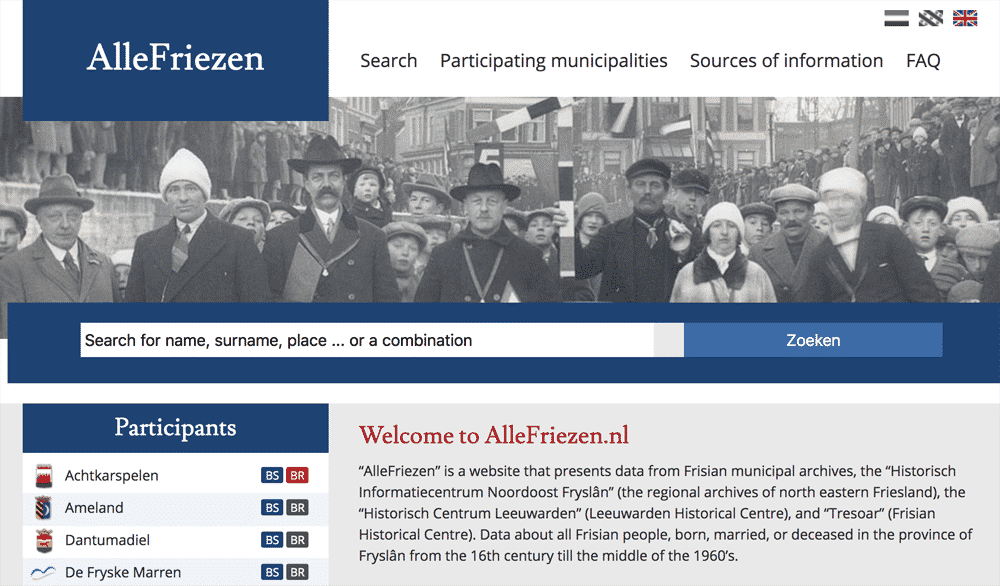
In the second half of the 19th century, many families from the northern provinces emigrated to North America. As such, Americans and Canadians are often looking for ancestors from Friesland, Groningen or Drenthe. The English-language AlleFriezen is good place to look for Frisian ancestors.
The website offers more than 15 million records from several archives. The core of the website is a database with information from civil records, population registers, parish registers and notarial records. For many index entries, you can view either a digital image or a link to the image’s source.
One record highlight is a collection of almost 17,000 Frisian emigrants. From the Advanced Search page, select Emigranten to view just these records. Each entry includes the name of the person, a date of birth, and a date of emigration along with the place, state or country the person moved to.
You can also use the search box to look for specific places or states (though, of course, not all records include this level of detail). For example, a search for Montana yields 50 records, including Lieuwe Westra, who relocated from Oostdongeradeel to Montana and Wyoming on 4 December 1891. In a blue box below Lieuwe’s information, you’ll see entries for his wife and five children, who emigrated with him.
If your ancestors hailed from the regions of Groningen or Drenthe, rather than Friesland, consider researching similar sites for each: AlleGroningers and AlleDrenten, respectively. Unlike AlleFriezen, neither website is available in English.
5. Geneaknowhow
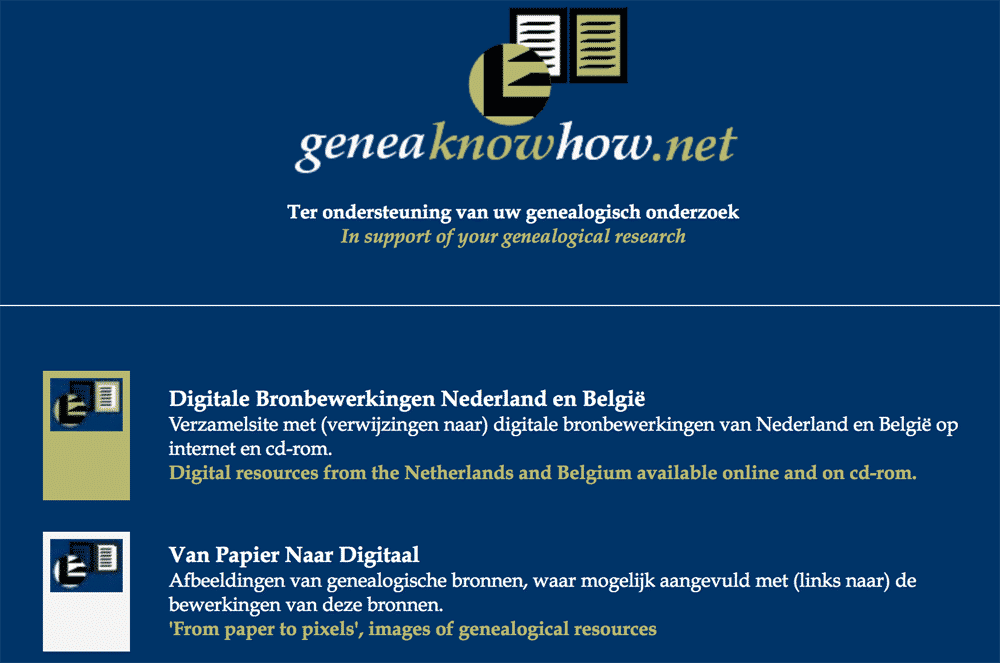
The four websites we’ve discussed thus far have been relatively large, but thousands of smaller websites can contain valuable information about your Dutch ancestors. Some offer databases about a specific location, while others are of societies or individuals publishing transcriptions or digital images.
The Geneaknowhow portal will get you in touch with these less-visible websites, containing links to resources for genealogy in the “Benelux” countries (Belgium, the Netherlands and Luxembourg).
The main menu offers access to seven modules:
- Digitale Bronbewerkingen (digital resources)
- Van Papier Naar Digitaal (images of genealogical resources)
- GeneaScript (indexes and transcripts)
- FAQ Genealogie Benelux (frequently asked questions in the Benelux research)
- Regelgeving in de Nederlanden (historical laws and regulations)
- Genea-Lokaal (various courses on genealogy and history topics—for example, paleography)
- Het verleden in beeld (illustrations for family histories, for example of old professions)
The main menu of the first module, with links to various genealogical resources, shows all the provinces of the Benelux countries. Each province’s page has the same structure: resources on a provincial or regional level, followed by links per town or city—all in alphabetical order.
With thousands and thousands of links to third-party websites, this database is bound to have a couple broken links. Nevertheless, the website is a terrific starting point for finding genealogical gems.
Bonus: Dutch Records on the Big Genealogy Websites
Most genealogists not living in the Netherlands will start their search for Dutch ancestors by using some of the big genealogy websites:
True, these three companies offer large collections with civil records, parish records, court records, notarial records and all kinds of other interesting sources. But the formats of these records vary: indexes without images, indexes with images attached, or images without indexes. Collections that connect the index entry to an image of the original source are the most valuable.
FamilySearch has indexed some records with the help of its volunteers, but most websites offer data that were created by third parties. These records are available as open data, a specific format that enables companies like Ancestry.com and MyHeritage to import large datasets and present them through their own interface. In other words: These records can often be found in their original form on Dutch websites, so you’ll want to consider researching on Dutch websites to get closer to the original source.
Conclusion
Searching for relatives in the Netherlands is an amazing adventure. So many records are already digitized and published online—not only by the big companies, but also by societies, archives or individuals. All these websites provide rich background information that is invaluable for genealogists.
Those of you with Dutch ancestors are up for a great journey: online by browsing all the records or on-site when visiting this beautiful country. Don’t wait until tomorrow—start today!
A version of this article appeared in the March/April 2020 issue of Family Tree Magazine.
ADVERTISEMENT

